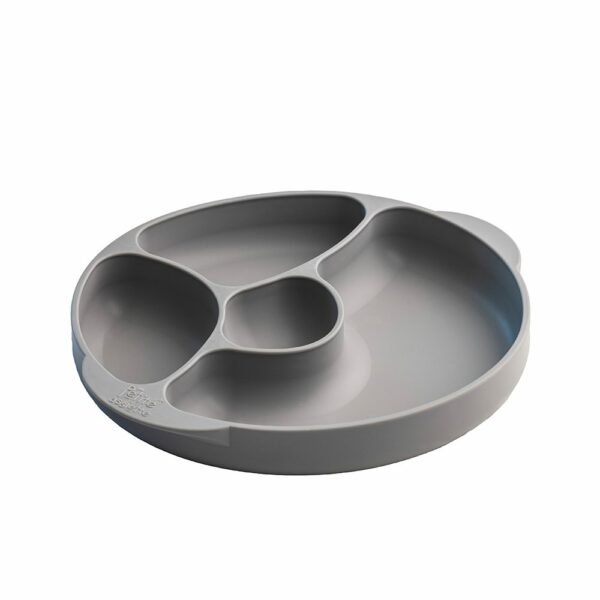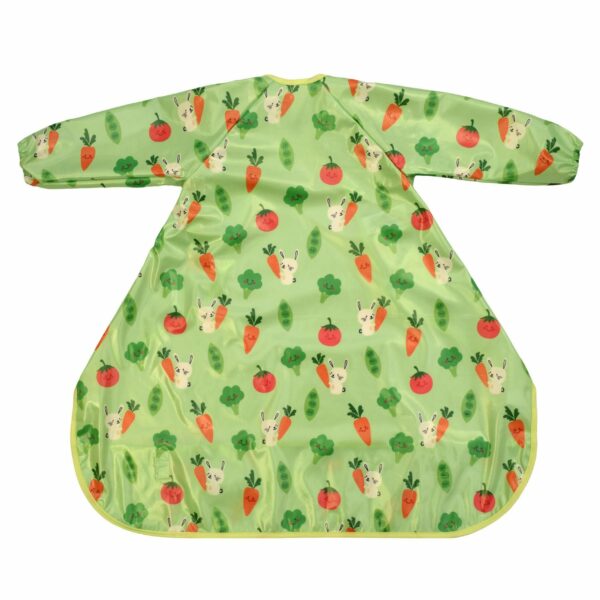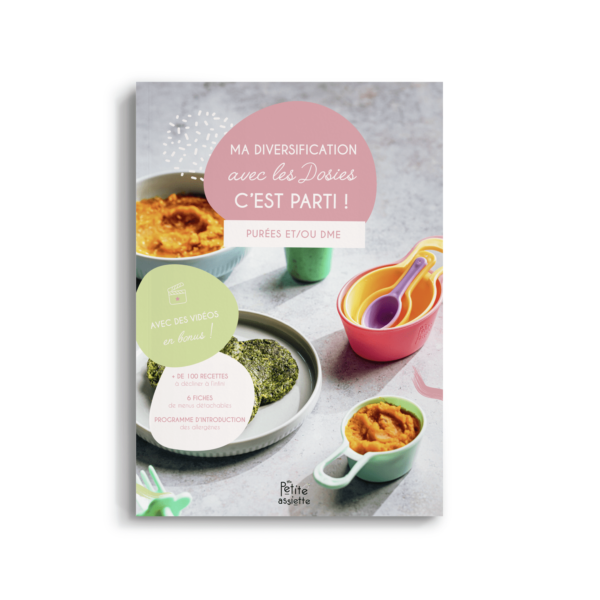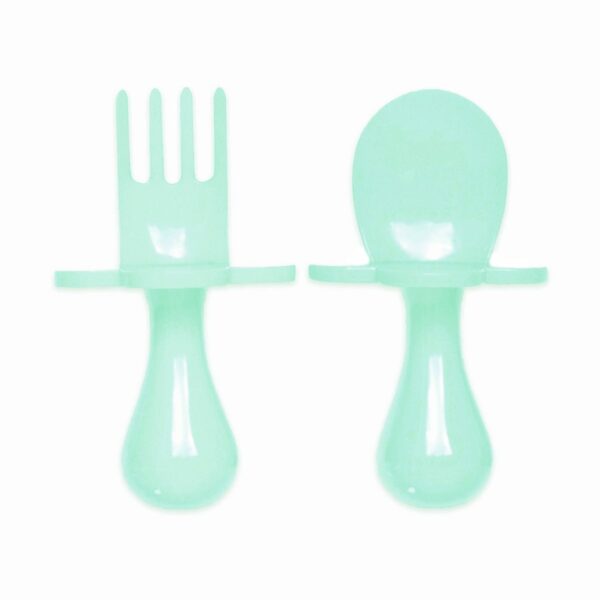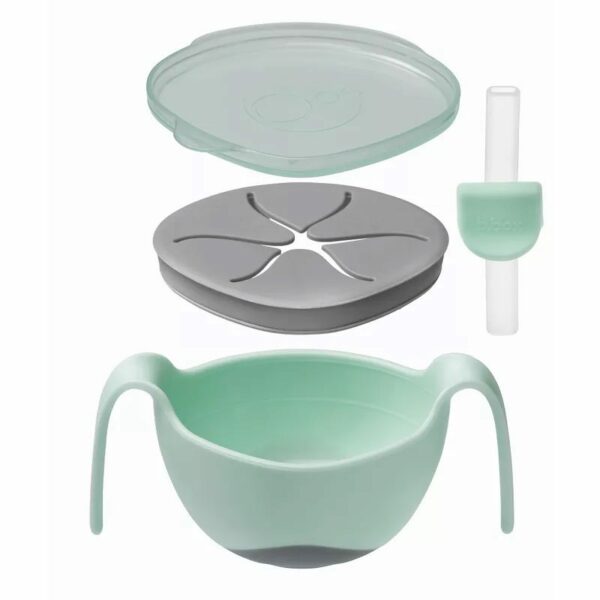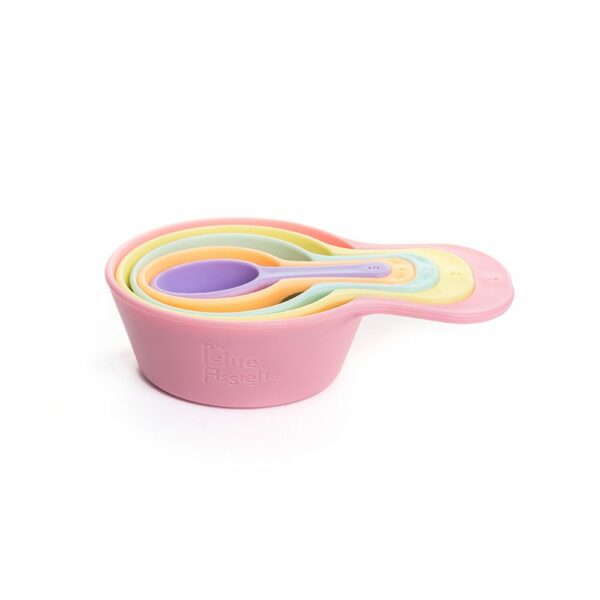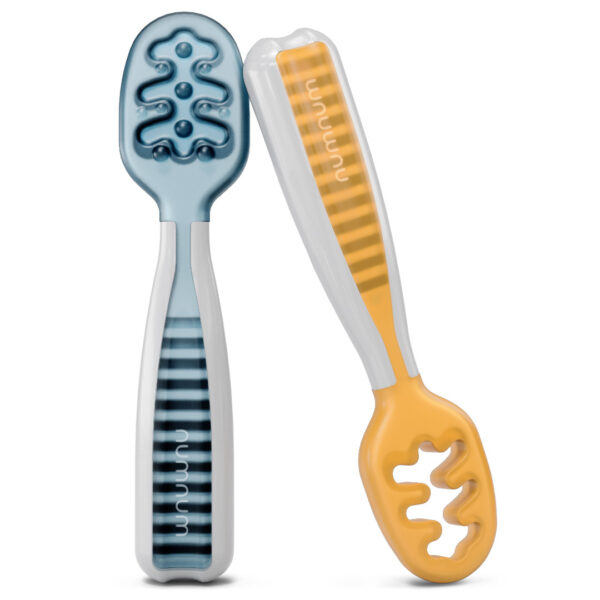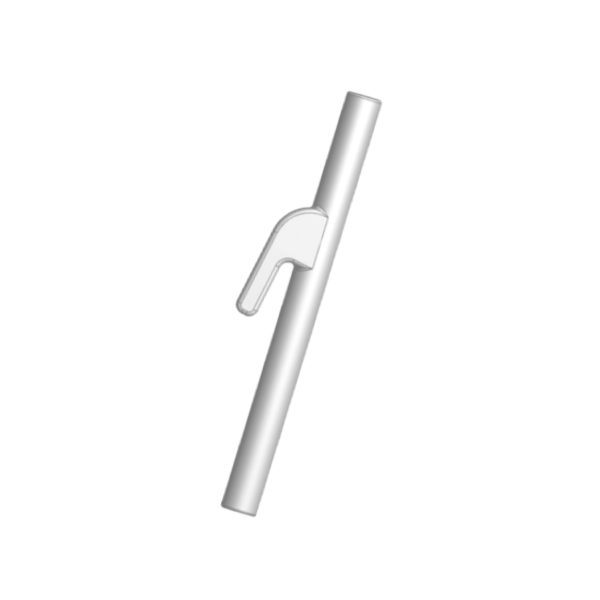FAQ
Les farines infantiles (ou céréales infantiles) ne doivent pas être données à bébé avant 4 mois, pour des raisons digestives. En effet, bébé n’est pas encore en capacité de digérer l’amidon. Vous pourrez introduire ces farines ou céréales infantiles sur conseil de votre pédiatre car elles pourraient favoriser un surpoids chez l’enfant si elles sont données en trop grande quantité et sans réel besoin pour bébé.
Vous pouvez donner de la farine ou des céréales infantiles avec ou sans gluten, toujours sur recommandations de votre pédiatre. Elles permettent d’introduire facilement le gluten chez les bébés, par rapport à une texture adaptée, à partir de 4 mois. Cela permet l’introduction de cet allergène durant la fenêtre de tolérance recommandée lors de la diversification alimentaire dans le but de réduire potentiellement le risque d’allergie.
L’âge d’introduction des morceaux dépendra avant tout de bébé, de son évolution et de ses envies. On commence généralement par donner des petits morceaux vers 8/10 mois, en donnant une texture dite « moulinée », « grumeleuse » voire « hachée » pour faire la transition avec la texture « mixée-lisse » ou « lisse ».
Vous pouvez également privilégier la DME (Diversification Menée par l’Enfant) pour l’introduction des morceaux. Il existe toutefois des précautions à suivre par rapport à cette méthode, à savoir : l’enfant doit se tenir assis avec un minimum de soutien et doit bien être installé pour manger, l’alimentation proposée doit être riche en énergie, et surtout en lipides, mais également en fer, la texture des aliments doit être adaptée aux capacités oro-motrices de bébé… Pensez à vous faire accompagner par des professionnels de santé formés et spécialisés, comme les diététiciennes-nutritionnistes pédiatriques, les orthophonistes, les ergothérapeutes…
Mais bébé vous fera sentir s’il est prêt à passer à l’étape supérieure !
Les pommes de terre peuvent être introduites dès 4 mois au même titre que la patate douce.
À partir de 6 mois, vous pourrez proposer du riz concassé, des petites pâtes, de la semoule, de la polenta… Les féculents sont indispensables à l’organisme de bébé, ils fournissent l’énergie nécessaire au bon fonctionnement de ses muscles, de son cerveau et de son cœur.
Ils permettent à l’organisme d’avoir de l’énergie toute la journée et de provoquer un effet de satiété sur le long terme.
Il est recommandé de mettre 1/3 de féculents et 2/3 de légumes dans les préparations proposées à bébé. Les légumineuses (lentilles, pois chiches ou cassés, haricots rouges, blancs ou flageolets et les fèves) peuvent être introduites dès le début de la diversification alimentaire mais toujours en petites quantités et bien mixées pour améliorer leur digestibilité.
Pendant de nombreuses années, il était préconisé d’introduire le gluten après 7 mois pour éviter les risques d’intolérance. Ce n’est plus le cas aujourd’hui, au contraire, des études récentes ont montré que l’introduction de céréales contenant du gluten entre 4 et 6 mois permet de réduire le risque d’allergie future au gluten.
Non ! Pas avant 3 voire 5 ans. Ceci pour des raisons sanitaires. En effet, un fromage au lait cru ou au lait thermisé a beaucoup plus de risques de contenir des bactéries potentiellement dangereuses pour un jeune enfant comme la listéria, ou les vecteurs de brucellose (surtout pour les fromages de chèvre ou de brebis au lait cru). Il existe aujourd’hui une recrudescence de listériose par exemple car, vous le savez certainement, le système immunitaire du jeune enfant est encore immature. Donc, proposez-lui uniquement des fromages au lait pasteurisé, il aura tout le temps de découvrir notre beau patrimoine de fromages plus tard…
Concernant la croûte des fromages, enlevez-la. Elle est porteuse de nombreux germes.
Là encore, il n’y a pas de règle. Certains bébés vont commencer le repas du soir à 6 mois quand d’autres ne le feront qu’à 10 mois ou plus. Il faudra donc veiller aux signes que vous donnera bébé. Dans la majorité des cas, les bébés commencent à prendre un dîner vers 8/9 mois.
Le lait restant l’aliment principal de son alimentation jusqu’à 12 mois, si le biberon du soir lui suffit et qu’il ne montre pas de signes de “faim nocturne” alors pas de pression. Si le biberon ne suffit pas à le caler et s’il montre un intérêt à compléter son repas, ce sera peut-être le moment pour une petite purée de légumes avec des féculents, sans oublier d’ajouter 1 à 2 cuillères à café de matière grasse.
Nous vous conseillons de commencer par des légumes de saison, savoureux et riches en vitamines mais vous pouvez commencer par ce que vous voulez car de nombreux légumes surgelés sont tout aussi intéressants.
Voici une liste de légumes pouvant être introduits : carotte, courge, potimarron, épinard, blanc de poireaux, blette, haricots verts, choux (fleur, brocolis…), courgette, betterave, artichaut, aubergine, fenouil… Le plus important sera de varier les légumes pour lui faire découvrir un maximum de saveurs.
Vous pourrez ajouter de la pomme de terre pour lier la purée et en faire un plat plus conséquent, sans oublier d’ajouter 1 à 2 cuillères à café de matière grasse.
Pas besoin de dents pour manger des morceaux ! Vous avez déjà remarqué que lorsqu’un bébé sans dents vous mord le doigt, ça fait mal ?
Ce qui est important c’est que bébé ait le réflexe de mastication. Eh bien c’est grâce à la force de ses mâchoires que bébé va pouvoir manger des petits morceaux mous et bien cuits. Par ailleurs, ces mêmes morceaux vont aider à la stimulation de la poussée dentaire. Donc, si les dents ne sont toujours pas là, pas de panique, elles finiront par sortir !
Oui ! Dès le début de la diversification, bébé va pouvoir découvrir le laitage nature (yaourt, fromage blanc, faisselle et petit suisse) car il n’y a pas besoin d’ajouter de sucre. Il est préférable de prendre des laitages au lait entier qui auront plus de matières grasses bénéfiques pour le développement du cerveau de bébé, donc surtout pas de produits allégés !
Yaourt classique ou spécial bébé ?
L’Anses (Agence Nationale de Sécurité Sanitaire) précise et rappelle que « seul le lait maternel ou préparations infantiles permettent de couvrir les besoins du nourrisson. Le lait courant, quelle que soit l’espèce animale productrice, n’est pas adapté aux besoins nutritionnels des enfants de moins d’un an.»
👉 Le lait maternel, ou lait infantile, reste l’aliment principal de l’alimentation de bébé à raison de 500 ml par jour minimum, jusqu’à ses 12 mois
Il n’y a donc pas vraiment d’intérêt nutritionnel à introduire les yaourts « bébé » en remplacement du lait infantile ou maternel, si ce n’est pour la découverte gustative comme pour tous les autres aliments. Mais connaissez-vous leur composition ? 🤔
Si à une époque certains yaourts étaient faits à base de lait infantile et pouvaient venir se substituer à ce dernier, ce n’est malheureusement plus le cas aujourd’hui. Ils ne sont en effet plus enrichis en fer, acides gras essentiels et autres nutriments présents dans le lait infantile, c’est pourtant une idée qui est encore très largement répandue !
Mais force est de constater que la composition nutritionnelle entre les yaourts « bébé » et yaourts « classiques » est quasiment identique, sauf concernant la quantité de glucides. Les yaourts « bébé » contiennent souvent du sucre ajouté. Je vous recommande donc d’être vigilant(e) sur ce point en vérifiant sur la liste des ingrédients.
Petite astuce : si vous décidez de faire une sortie pique-nique avec bébé, les yaourts bébé peuvent être une solution pratique car ils n’ont pas besoin d’être conservés au frais 😊 !
Tout dépend du mode de conservation !
Au réfrigérateur, c’est 48 heures maximum en filmant bien les préparations afin qu’elles soient totalement étanches. Sous vide, la durée de conservation peut aller jusqu’à 10 jours.
Enfin au congélateur, technique la plus utilisée, on peut conserver les préparations jusqu’à 6 mois.
Il est moins cher, est plus accessible, on en trouve dans toutes les grandes surfaces…
Oui, c’est sûr, le lait de vache présente des avantages MAIS tous les spécialistes sont formels, il ne devrait pas être consommé à la place du lait maternel ou infantile par un nourrisson avant l’âge de 12 mois minimum. De plus, à partir de l’âge d’un an, idéalement, l’enfant devrait consommer du lait de croissance jusqu’à ses 3 ans.
Le remplacement précoce du lait de suite par du lait de vache entraîne une baisse des apports en fer, acide linoléique, vitamines B9, C, D et E et une augmentation considérable des protéines.
En revanche, le lait de vache peut être utilisé dans les recettes de cuisine, pour cuire un légume ou dans un gâteau.
Chaque individu et donc chaque bébé est unique et aura des besoins différents. Les parents sont souvent perdus quant aux quantités à donner à bébé. On vous donne sur ce blog des tableaux avec les quantités indicatives, qui seront revues à la hausse ou à la baisse en fonction de l’enfant. Il existe même des petits outils pratiques pour vous aider à doser les aliments comme les dosies que nous proposons sur notre site 😊
Les 2 familles d’aliments importantes sont celles qui sont riches en protéines comme la viande, par exemple (qui ne doivent pas être surdosées au risque de fatiguer les reins de bébé) et les matières grasses qui ne doivent pas être oubliées. Attention aussi au sucre et produits sucrés, on en limitera fortement la consommation avant les 3 ans de bébé.
Il faut surveiller avant tout la courbe de croissance qui ne doit pas être cassée. Si tel est le cas, il faut le signaler à son pédiatre/médecin traitant afin de voir ce qui ne va pas.
Elles sont essentielles et apportent de l’énergie, des vitamines (A, D, E, K), des acides gras essentiels qui contribuent entre autres au bon développement du cerveau de bébé. Le lait maternel en contient et les laits infantiles en sont enrichis.
Lorsque la part de lait (maternel ou infantile) se réduit dans l’alimentation au profit d’aliments solides, aux alentours de 6 mois, il faut alors commencer à ajouter des matières grasses variées dans son alimentation.
Alternez les différentes huiles végétales en privilégiant l’huile d’olive et l’huile de colza (ou de noix ou de lin) ou bien choisissez un mélange d’huiles végétales riches en omégas 3. Vous pouvez aussi ajouter une petite noix de beurre de temps en temps dans la purée de bébé et vous pouvez aussi utiliser de la crème fraîche pour diversifier le goût et la texture.
Toutes ces matières grasses seront de préférence ajoutées crues ou fondues dans l’alimentation de bébé.
Avant 6 mois, il est très rare que bébé boude son lait. Il conviendra dans ce cas de vous rapprocher du médecin ou du pédiatre de votre enfant ou de consulter tout professionnel de santé spécialisé en pédiatrie pour vous accompagner s’il s’agit d’un trouble alimentaire pédiatrique.
Après 6 mois, le refus de biberon correspond souvent au besoin de bébé de continuer à découvrir de nouvelles saveurs et parce qu’il a pris goût à vos bons petits plats, c’est une étape normale : bébé s’exprime et s’affirme ! Il peut prendre 2 repas complets par jour ce qui correspond au déjeuner et au goûter voire au diner pour certains.
Cependant, il doit continuer de prendre 500 ml de lait infantile par jour pour son bon développement et éviter les carences en acides gras essentiels et en fer. Vous pouvez compenser en proposant des laitages natures au lait entier de type yaourt, fromage blanc, faisselle et éventuellement petit-suisse. Un yaourt de 125 g correspond à 150 ml de lait environ.
Vous avez aussi la possibilité de mettre quelques cuillères de lait en poudre dans les plats que vous donnez à bébé ou de changer de contenant en optant pour un bol avec une paille par exemple.
Envisager une alimentation végétarienne ou végétalienne pour un bébé n’est pas sans conséquence. Il faut en discuter avec votre pédiatre/médecin traitant et une diététicienne-nutritionniste ou médecin-nutritionniste spécialisé en nutrition infantile afin de pallier les carences de fer et autres nutriments (zinc, protéines…) qui pourraient apparaître.
Quoi qu’il en soit, le lait, maternel ou infantile, doit rester la base de l’alimentation de bébé jusqu’à 12 mois.
Les produits carnés sont introduits à partir de 6 mois révolus. Les viandes, poissons et œufs (jaune et blanc désormais dès le début de la diversification alimentaire) apportent également beaucoup de vitamines et de fer qu’il est intéressant de varier.
On apporte une seule source de produits carnés par jour au déjeuner (les reins de bébé étant encore trop immatures pour donner des protéines en excès). En somme, pas de viande, poisson ou œuf au déjeuner et au dîner. Si la portion n’a pas été consommée le midi, elle peut exceptionnellement être donnée le soir.
Voici les quantités recommandées : on commence par 10 g de produits carnés à 6 mois, puis 20 g à 12 mois et 30 g à 3 ans…
Oui ! Elles peuvent être introduites à partir de 5/6 mois lors de la préparation des petits plats pour bébé. Elles n’ont que des avantages car elles sont très riches en antioxydants (sous un faible volume) et initient l’enfant au plaisir de manger des épices. Plus tard, cela lui permettra de manger moins salé et donc de prendre soin de son système cardiovasculaire. On limitera uniquement les épices pimentées, non adaptées aux palais de nos jeunes enfants.
Pensez qu’au-delà des épices, on peut aussi utiliser les herbes aromatiques et les condiments comme l’ail, l’oignon et l’échalote… à volonté dans tous les plats !
Épices : cumin, cannelle, curcuma, muscade, curry doux, paprika, vanille, badiane…
Herbes aromatiques : thym, persil, menthe, ciboulette, basilic, coriandre, aneth, sauge, cerfeuil, estragon, laurier, origan, romarin…
Ils sont très intéressants nutritionnellement parlant, et vous pourrez désormais les proposer à bébé dès le début de la diversification. Attention à n’en proposer qu’en petite quantité et mixés pour commencer, en effet, ils sont très riches en fibres et peuvent entraîner un inconfort digestif chez bébé dont le tube digestif est encore immature.
Parmi les légumes secs, on peut compter les lentilles (corail, blondes, vertes), les pois (chiches ou cassés), les haricots (rouges, blancs, flageolets) et les fèves.
Les diarrhées chez bébé sont souvent bénignes, mais il convient de consulter votre pédiatre/médecin traitant si cela perdure. Il faut avant tout penser à hydrater bébé en lui proposant de l’eau très régulièrement.
Privilégiez certains aliments comme la banane, la purée de carottes, le riz, les pâtes, les compotes pomme/coing ou pomme/banane. Il est aussi possible de donner des viandes ou poissons blancs et des matières grasses crues ou fondues. Evitez les aliments riches en fibres qui vont activer le transit.
Là encore, si bébé est constipé, il faut consulter en cas de doutes et si la situation perdure.
Pensez à bien hydrater bébé et à lui proposer régulièrement de l’eau.
A l’inverse de la diarrhée, on va lui proposer des aliments riches en fibres : les légumes en alternant les crus et les cuits (aubergine, épinard, artichaut, choux…), les produits céréaliers complètes (pains, pâtes ou riz complets…), les légumineuses (lentilles, pois, haricots secs et fèves), les compotes de pomme/pruneaux ou pomme/rhubarbe.
L’introduction de la viande permet à bébé de découvrir de nouveaux goûts et de nouvelles recettes, mais il est tout à fait possible de s’en passer et de compenser en donnant des poissons, des œufs et du fromage au lait pasteurisé à la place qui couvriront tout aussi bien ses besoins en protéines. Petite attention concernant le jambon blanc, il faudra en donner avec parcimonie car il est très salé.
Les produits céréaliers complets favorisent le transit qui est encore immature chez bébé. Il est donc préférable d’en donner en petite quantité au départ. Petit rappel : les produits céréaliers complets sont plus riches en minéraux, vitamines et fibres. Comme l’enveloppe des céréales est la première concernée lors de l’utilisation de pesticides, il conviendra de privilégier des produits issus de l’agriculture biologique.
À partir de 10 mois révolus, si vous les faites maison et que vous limitez l’apport en sucre. Vous pourrez les garder dans une boite hermétique bien fermée pendant 48 h.
Mais vous pouvez acheter dans le commerce des biscuits adaptés à l’alimentation infantile pour votre bébé. N’oubliez pas de lire les recommandations des industriels en ce qui concerne la conservation et surtout la date de péremption. Veillez à toujours rester proche de lui quand il mange ses biscuits, il arrive parfois que les bébés prennent de trop gros morceaux d’un seul coup et veillez également à limiter le sucre ajouté dans l’alimentation de bébé. Une texture croustillante et fondante, comme les boudoirs, est à privilégier au début.
À partir de 7 mois révolus, que votre bébé ait ses premières dents ou pas.
Bébé va suçoter ce petit morceau de pain qui soulagera ses gencives lors de la poussée de ses petites dents. Veillez à toujours rester proche de lui quand il mange son morceau de pain, il arrive parfois que les bébés prennent de trop gros morceaux d’un seul coup.
